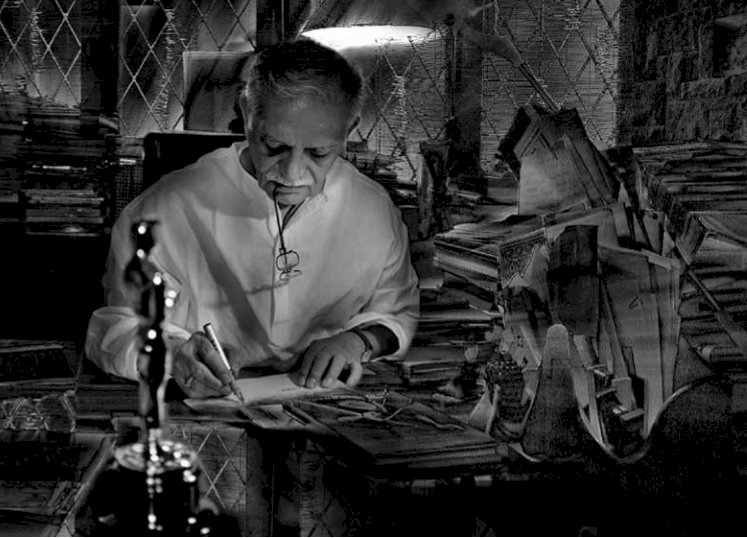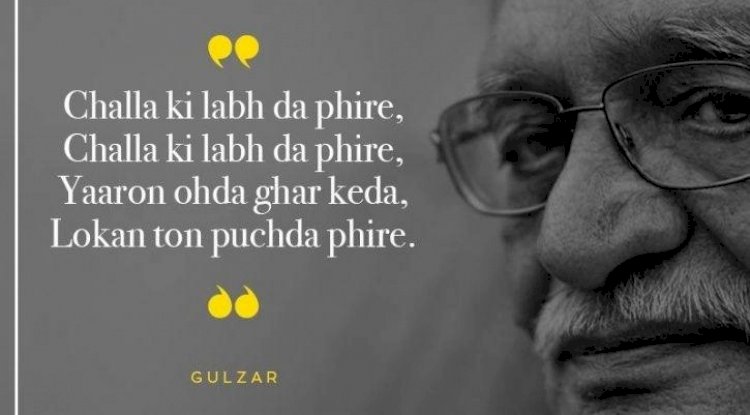Gulzaar Saab : The Man Whose Lyrics Still Creates A Parallel World Around Us
Jaguljar Sahab is 85 years old, his ghazals are still 28 years old as it took him twety eight years to be what he is known for today. He has added a new genre "Triveni" in Hindi poetry which also took him 28 years to develop. Triveni is a three line poem, it is believed that this genre was developed by Gulzar Saheb.
By garima

"Waqt Rehta Nahin Kahin Tik Kar, Aadat Iski Bhi Aadmi See Hai."
Born Sampooran Singh Kalra in Deena, in the Jhelum District in what is now Pakistan, he came to Delhi after the partition during independence as a poet. He joined Bimal Roy Productions in 1961 and got his first break as a lyricist writing for Bimal Roy's Bandini (1963). The success of this film made him Bimalda's full-time assistant and got him writing for films by acclaimed directors like Hrishikesh Mukherjee and Asit Kumar Sen. Some of the films he has written include Anand (1971), Guddi (1971), The Chef (1972), and Traitor (1973) for Mukherjee; and Do Dooni Char (1968), Khamoshi (1970), and Safar (1970) for Sen.
Jaguljar Sahab is 85 years old, his ghazals are still 28 years old as it took him twety eight years to be what he is known for today. He has added a new genre "Triveni" in Hindi poetry which also took him 28 years to develop. Triveni is a three line poem, it is believed that this genre was developed by Gulzar Saheb. Some people compare this genre with Japanese poetry mode Haiku and also call it indigenous version of Japanese Haiku but it is a completely indigenously developed genre and Japanese poetry genre is an independent genre unlike Haiku. There is only so much similarity between Haiku and Triveni that both have only three lines, apart from the equivalence of these three lines, there is no equivalence in these two genres. The original inspiration of Triveni's work is also called Japani poetry. By the way, Gulzar Saheb had given its definition in this way on the occasion of publication of his Triveni collection.
"Tere jaane se kuch badla toh nahi..
Raat Bhi Aai Thi,
Chaand Bhi Tha,
Haan Magar Nind Nahi,,"
Initially, when Triveni form was created, it was not known as to what confluence it would reach - the name Triveni was given because the first two miscreants meet like Ganga-Jamuna and one thought that even after their confluence there is another river under these two streams - Saraswati who is incognito and cannot be seen; The work of Triveni is to show Saraswati. The third mirara is hidden, hidden in the first two miracles.
Other than Triveni, his versatility is noticeably visible from his work. On one hand, he can pen down a love ode Kajra Re, and on the other, it was him who wrote Oscar-winning Jai Ho with AR Rahman. While he can pull off a 'Ae Papad Wale Panga Na Le' from Makdee, he can write a love song that states, 'Dil sa joi, kameena nahi..'. He knows how to capture attention and hearts, with the right set of words.
Gulzar Saab is one writer and poet who has managed to capture the fancy and hearts of people, where age is no bar. The way Gulzar Saab has penned down lyrics and nazms that manage to convey the pain, yearnings of a heart and grief, it's unmatchable. While a 15-year-old today loves to read Gulzar's poetry, a 25-year-old me still fancies and adores his Bollywood numbers. And the internet agrees.

For him sound of silence is the most beautiful and divine sound and honesty is what matters. An eminent lyricist, director and poet, Gulzar's poetry makes you feel ecstatic and takes you to a divine world. One thing that is special about him is that from contributing to the 1963 movie Bandini to the 2014 movie Kill Dil, he has been able to move and contribute according to the time and has not left his poetic past behind.
"Nostalgia is a sweet place for a poet and writer to be in"-Gulzar Saab
What's Your Reaction?



















